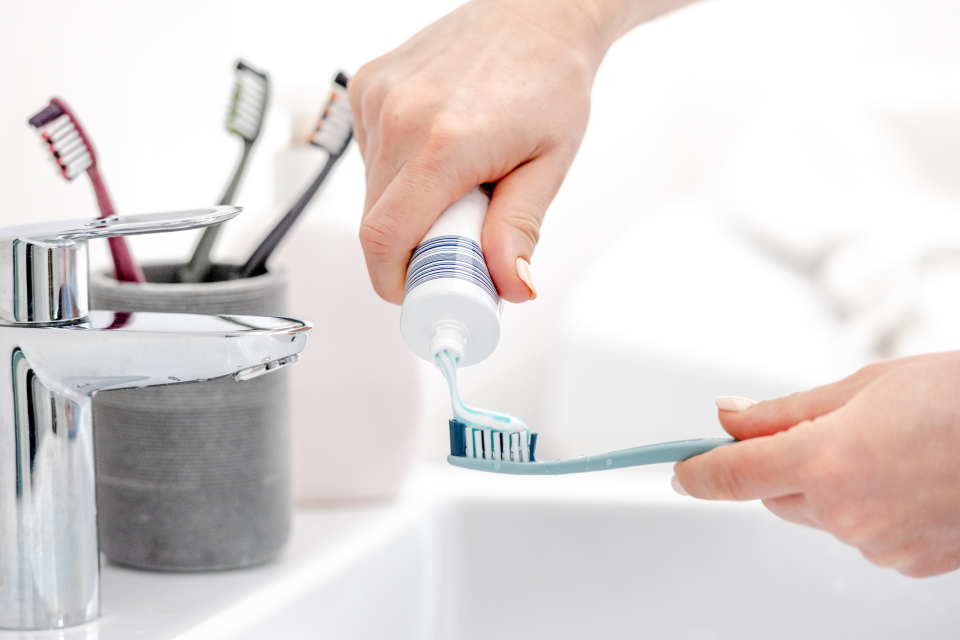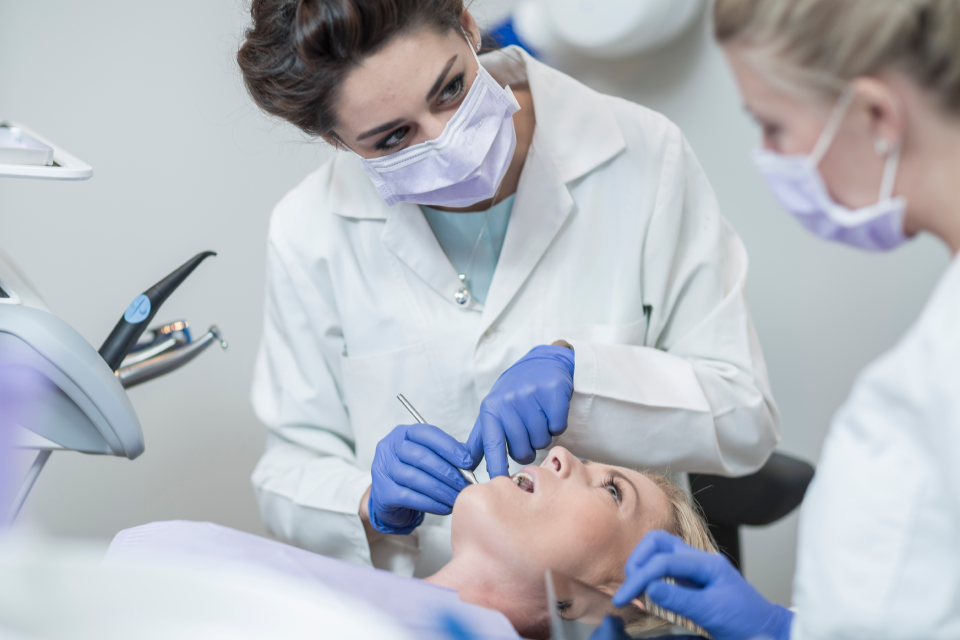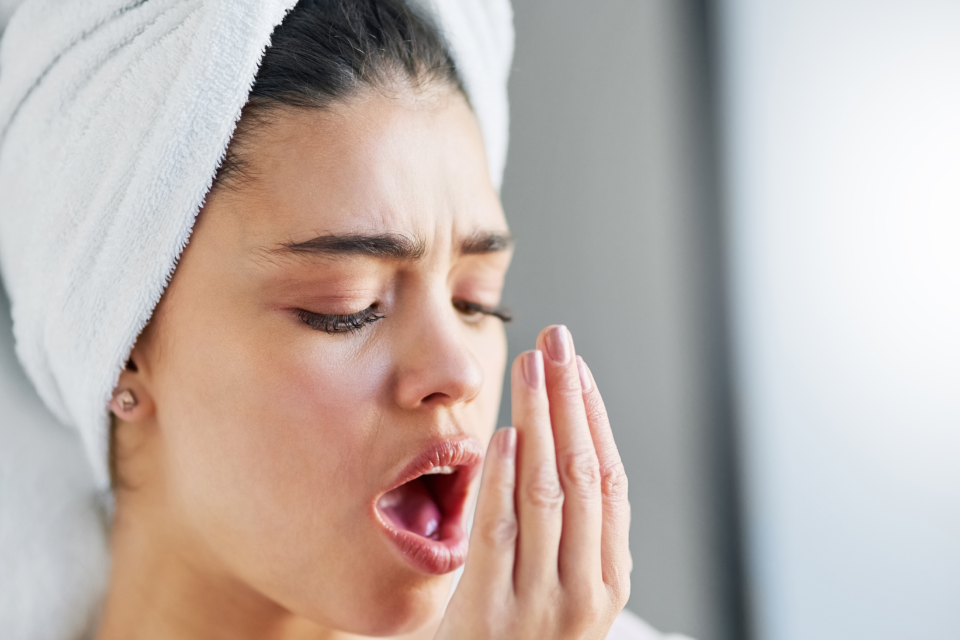For many people, bad breath is a daily issue that impacts their social interactions and physical well-being. Also known as halitosis, bad breath is commonly caused by poor oral hygiene, gum disease or an especially dry mouth. For most people, maintaining regular brushing and flossing will quickly improve their breath. You can also cure bad halitosis by cutting back on smoking, altering your diet and staying hydrated. If none of these options work, we recommend visiting your local dentist, who can diagnose the cause of your bad breath.
What is halitosis?
Halitosis is the medical term for when you have bad-smelling breath. There are times when everyone has an unpleasant breath, for example, when you first wake up in the morning or after eating an especially smelly food like garlic. Usually, these symptoms will dissipate after having something to drink or brushing your teeth.
However, foul breath that doesn’t go away could be the sign of an underlying issue, such as gum disease or tooth decay. Halitosis is also incredibly common, with recent estimates of 1 in 4 people across the world struggling with bad breath.

What are the symptoms of bad breath?
Obviously, the major symptom of halitosis is foul-smelling breath. However, there are additional symptoms that you may be experiencing, which are linked to bad breath. These can include:
- White coating on tongue – A white tongue can be an indication of bad breath. This is because a white buildup is often due to excessive bacteria or food particles, which can both lead to bad breath.
- Plaque and debris buildup – If you can see visible buildup of plaque around your teeth, this can be a telltale sign of poor oral hygiene and bad breath. This usually looks like a slimy film or yellow coating on your teeth.
- Dry mouth – One of the more common symptoms of halitosis. Because saliva helps to wash away foul-smelling bacteria, when your mouth is dry, your breath may smell worse.
- Constant metallic or sour taste – Having a constant bad taste in your mouth. This is a clear sign of bad breath, but could also indicate a more serious underlying issue with your teeth, such as gum disease or decay.
Sometimes, you may not even realise whether your breath smells or not. Simply asking a friend, partner, or someone you trust can be a quick solution. However, not everyone feels comfortable getting exposed to unpleasant halitosis. If this is the case, please reach out to your local clinic or the team at Hawthorn Road Family Dental for a professional diagnosis.
What causes bad breath?
Bad breath can be caused by a range of different factors. Many of these stem directly from poor oral hygiene, but can also originate from your diet and lifestyle. Halitosis can be caused by the following:
- Poor oral hygiene – The most common cause of bad breath. When you don’t brush or floss your teeth enough, smelly bacteria can quickly build up. Particularly after eating, as food particles can develop between your teeth, which break down to produce an odour.
- Gum disease – Gum disease, also known as gingivitis, is an inflammation of your gums. It’s most commonly caused by plaque, which is a sticky film of bacteria that builds up in your teeth. Although it can be removed by brushing your teeth, if left untreated, it can lead to tooth decay and gingivitis. The bacteria involved in gum disease can release a particularly smelly odour that contributes to bad breath.
- Dry mouth – Saliva is important for washing out your mouth. So when you’re not producing as much saliva, bacteria can quickly form, which leads to smelly breath. This is a common reason why you may have bad breath in the morning, as your mouth creates less saliva when sleeping overnight. Dry mouth can also be caused by underlying conditions such as diabetes.
- Food choices – What you eat can also contribute to halitosis. Foods that are particularly strong-smelling, such as garlic or onion, can linger in your mouth.
- Smoking – If you are a consistent smoker, the tobacco smoke can stain your teeth and dry out your mouth over time. Tobacco use also contributes to gum disease and future tooth decay, which can also lead to bad breath.
- Infections – If you develop a sinus or throat infection, this may cause a postnasal drip. This is when more mucus than normal develops around the back of your throat. This buildup of mucus can be a breeding ground for bad-smelling bacteria.
- Acid reflux – Although the majority of bad breath comes from within your mouth, occasionally it may spring from other parts of the body. When acid from within your stomach flows back up your oesophagus, this is what’s called acid reflux. This creates bad breath because it allows acid or undigested food to travel back up towards your mouth.

How can I permanently get rid of bad breath?
We recommend taking the following measures to stamp out bad breath:
- Brush and floss more often – Improving your oral hygiene could be all it takes for bad breath to go away. You should be brushing your teeth at least twice a day to remove as many food particles as possible. Try to brush thoroughly for between 2 to 3 minutes, and buy fluoride toothpaste which strengthens your tooth enamel. You should prioritise brushing after you eat and before you sleep, when saliva production decreases. Flossing should also be a regular part of your daily routine, allowing you to reach bacteria and particles that your toothbrush can’t.
- Tongue cleaning – Your tongue is often a breeding ground for bad-smelling bacteria. Brushing or scraping down your tongue can help clean away the buildup. Buy a tongue scraper that is designed specially for reducing bacterial growth. They can also be applied to other parts of your mouth where buildup can occur, such as your inner cheeks or the roof.
- Use Mouthwash – This is an excellent way to quickly improve your breath. An antibacterial mouthwash kills the bacteria that cause halitosis to freshen up your mouth. Particularly after eating, swishing your mouth can help you loosen up any food particles that get stuck between your teeth. It is important to choose a mouthwash that doesn’t contain any alcohol, as this can dry out your mouth. It should also never be a substitute for proper brushing and flossing.
- Chew sugar-free gum – By chewing on sugar-free gum or candy, your body can generate more saliva, which helps to wash away any food particles or smelly bacteria. These bacteria thrive on sugar, so we recommend avoiding any mints or gum that are overly sugary.
- Eliminate smoking – If you are a frequent smoker, cutting back on tobacco products is one of the best measures to stop foul breath, as it can both stain your teeth and dry out your mouth. Please contact your local healthcare provider for further assistance if quitting is a challenge for you.
- Dental appliances – We recommend keeping all of your dental appliances squeaky clean. This should include any dentures, retainers, or braces, which should be thoroughly cleaned daily as instructed by your dentist. These appliances can trap oral bacteria and food particles within, which can lead to halitosis if left uncleaned.
- Optimise your diet – Try to cut out a lot of the foods that cause bad breath. Onions and garlic are particularly bad, as well as spices with a lingering odour. Healthy foods will be your best bet. Apples, carrots, and celery can all boost saliva production through the act of chewing. Any foods that are loaded with Vitamin C, such as lemons or oranges, are also great because they promote healthy gums. Also, try yoghurt because it introduces good probiotics into your mouth, which can overpower the bacteria that cause bad breath.
- Stay hydrated – Not only is drinking water crucial for overall health, but it can help tame bad breath. Water is an essential ingredient for producing saliva, which naturally washes out your mouth of bacteria. Try to avoid caffeine and alcohol as much as possible, as these have a dehydrating effect, which dries out your mouth.

When to Get Professional Help for Bad Breath?
Halitosis can be something that everyone deals with. In most cases, practising good oral hygiene should be enough to clear up any bad breath. However, if the smell doesn’t go away, and you’ve tried our above remedies, then we recommend seeing your dentist. Particularly if your bad breath is accompanied by persistent pain, swelling or bleeding, this could indicate an underlying oral issue.
Your dentist will be able to check your mouth for halitosis and see if it’s being caused by any infections or gum disease. They will be able to advise you on how to practice good oral hygiene and carry out a professional cleaning for any trapped food if needed. If your dentist can’t find any issues related to your oral health, they can also refer you to a medical doctor for assistance.
One of the most common issues for dental clinics, bad breath, can stem from a variety of causes. These can include inconsistent oral hygiene, as well as tobacco smoking or a dry mouth. For many people, just improving their brushing and flossing should clear away any halitosis. You can also keep up your hydration levels, chew sugar-free gum or alter your diet to improve your breath. If your halitosis persists, we recommend reaching out to our expert team at Hawthorn Road Family Dental, who diagnose and treat any unpleasant breath.





